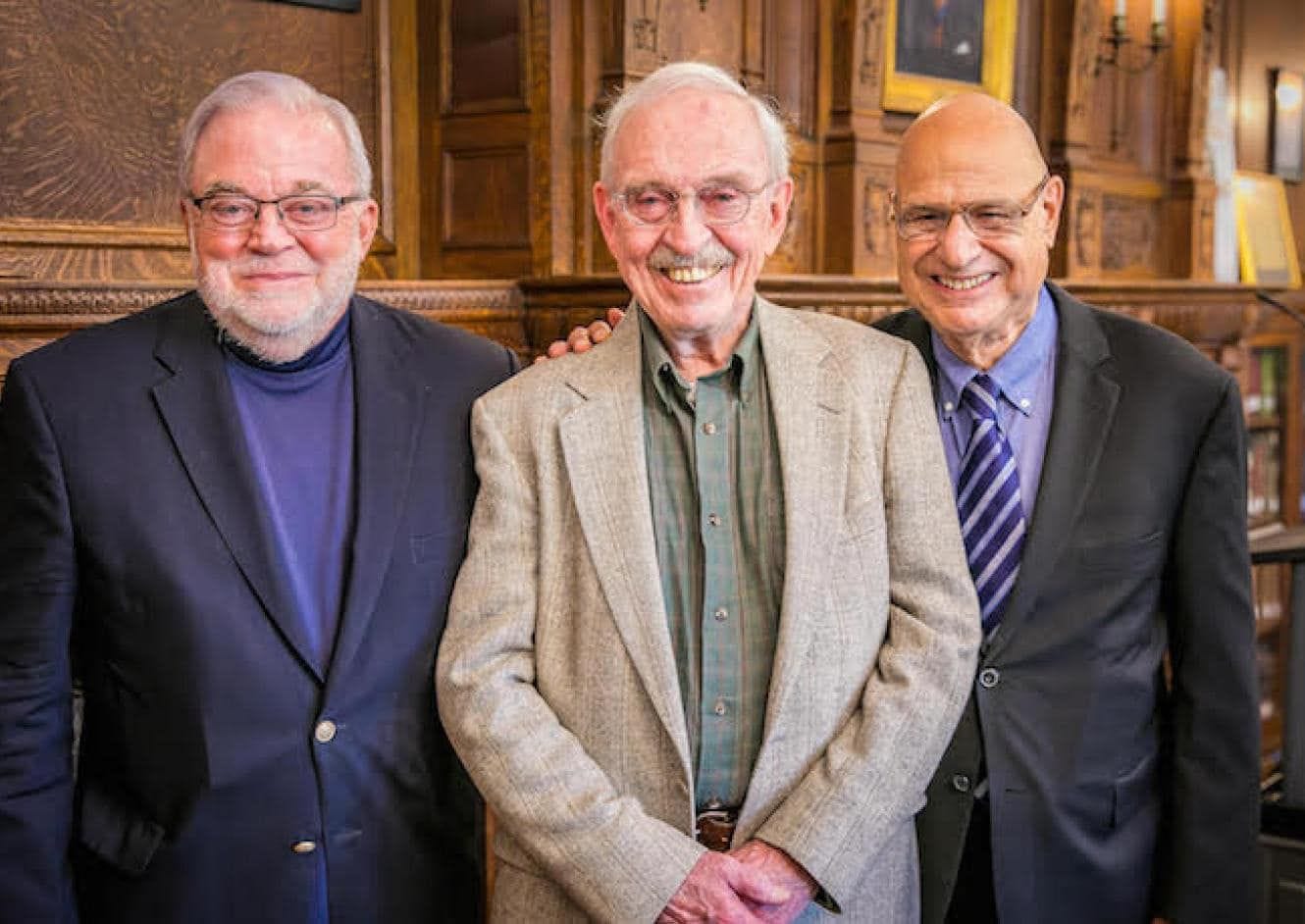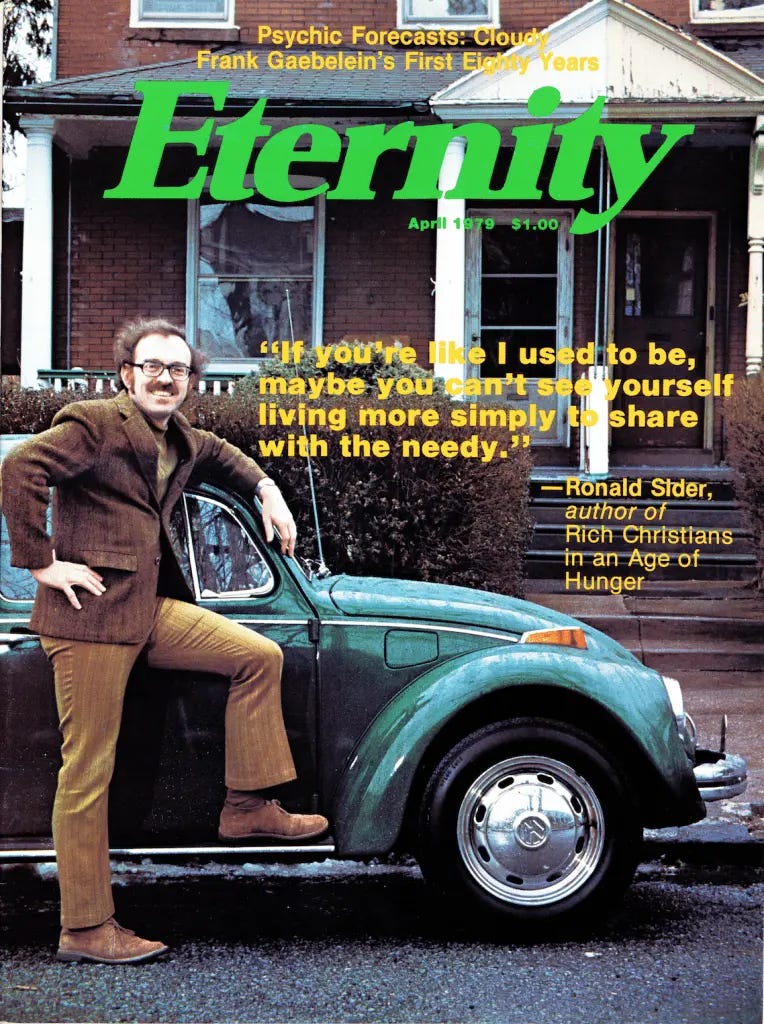Remembering Ron Sider, an evangelical who truly lived the gospel
The number of people whose lives were touched and changed by what Ron Sider wrote, said and did are legion. Many stayed Christian and became stronger in their beliefs because of his vision.
I was blessed to attend Ron Sider’s memorial service last weekend.
Ron passed away on July 27 from cardiac arrest. He was 82, and had just returned home after a positive checkup following successful treatment of gallbladder cancer. Back home, Ron was sitting in his living room with Arbutus, his wife of nearly 61 years, beside him in a chair big enough for them both. Then, on a trip to the bathroom, he suffered a fatal heart attack.
All our hearts fail at the end of our lives, but Ron’s never did during his life.
Ron was best known for a book, one that had more impact on the issue of poverty in the Christian world than any other single book in our time: Rich Christians In An Age Of Hunger. Many other books were to follow, as well as countless articles, speeches, sermons and conferences over more than five decades. But his astounding amount of work was really about one thing: trying to understand what it meant to follow Jesus Christ.
Ron Sider just didn’t write books, he lived a life. And his extraordinary life was committed to that overarching mission and goal– to follow Jesus and be his disciple. Raised on a farm in rural Ontario, Ron was the first in his family to attend college and went on to earn a doctorate in church history at Yale University with renowned scholar Jaroslav Pelikan. Ron taught and lectured at more universities, colleges, and seminaries than he could count.
Ron also convened what became an historic gathering at the downtown Chicago WMCA over Thanksgiving weekend in 1973. I was also deeply involved in that meeting, which combined established and older evangelical leaders with younger evangelicals like John Perkins, Bill Pannell, Richard Mouw, Nancy Hardesty, and many other men and women – White, Black, and Hispanic – who wanted to take the evangelical world to a new place: to understand and proclaim the gospel as both personal and social. The Chicago Declaration of Evangelical Social Concern was the product of that cross-generational meeting. Its influence went far and wide, and got significant press coverage. As an editor of the statement, I remember working through the “jots and tittles'” (a familiar term in the evangelical world) of the piece with elders like Carl F.H. Henry, the founding editor of Christianity Today. Looking back, it began a story that lasted through the 1970s of younger evangelicals changing evangelicalism to take on major social issues of poverty, racism, sexism, war and peace.
After the Chicago Declaration, Ron formed Evangelicals For Social Action, which is now called Christians for Social Action and led by Nikki Toyama-Szeto.
Ron would take on tough, up-hill challenges that were not always as successful as the 1973 Chicago gathering and declaration. Ron’s attempt to form “Evangelicals for McGovern” in 1972, for example, didn’t draw a large membership. I think there were six of us!
Ron served many roles: as a thinker and scholar, teacher, mentor to students and rising leaders, author and co-author of countless volumes, international speaker and chapel preacher at most every Christian college in America, most multiple times! And he was a dear friend to many of us who were blessed by his presence on God’s earth, including me.
At his memorial service, one of his longtime co-workers, Heidi Unruh, captured the breadth, depth, grace, and humor of Ron’s many roles well. Here is her description of Ron Sider’s wonderful pilgrimage:
It’s easy to summon a mental image of Ron standing at a podium or lectern, perhaps giving a lecture, preaching a sermon, or addressing a conference. He presented a posture of confidence without conceit, boldness without bluster, that humble bravado that was uniquely Ron. He spoke with a compelling earnestness in pulling back the curtain on the injustices in the world and spotlighting what God expects Jesus-followers to do about it. I seldom heard Ron give a talk that didn’t include some daunting challenge and some daring hope.
Ron was comfortable on the center stage, certainly. But I can also picture him sitting to the side of the room, perhaps at a board meeting, or a dialogue or working group he had brought together. He is leaning back in his chair, attentive but relaxed, giving others space. In the posture of a convener, he brought people to the table to have their say and seek common ground. Ron put Jesus at the center, so he didn’t always have to be.
Ron was pleased to see others shine. He didn’t seem threatened by others’ giftings—he honored and made full use of them. This quality also made him an excellent mentor. Offering encouragement, opening doors, intentionally giving credit to the work of others … I will always be grateful for these qualities, because they changed my life.
For me, the most blessed part of Ron’s memorial was the reception after the service, when family and friends gathered to eat and share personal stories about an obedient Christian, influential role model, and great family man. I was touched by the stories of Ron’s teenage grandchildren. They didn’t talk about Ron’s books, speeches, and conferences, but about how much they felt so deeply loved by their Papa. They spoke, often tearfully, of how they were so completely accepted, unconditionally loved, and cared for by him, how good it always felt just to be around him, how much fun they always had with their grandpa. They felt like his priority and loved how he was always smiling when he was with them. It was moving and quite wonderful to hear those personal testimonies to Ron Sider – and I imagined him smiling as they spoke.
We all laughed at some of the funny stories about how Ron tried to live consistently with the visions he proclaimed, doing his best to be faithful in his lifestyle and home. He bought his clothes at a thrift shop, where his children and grandchildren have long memories of having to shop there. I recall the well-worn tweed sport coat that Ron wore most of the time. He refused to buy a new briefcase and carried the same old leather one around, using duct tape to cover up the holes. The Sider family lived in a patched up old house in the city, in a racially and economically diverse neighborhood. Ron heated his house with a wood stove, later converted to a cast iron stove, with wood he found in the neighborhood. He and Arbutus never had central heating until they went to their retirement home. Though sometimes awkward, humorous, and even embarrassing to their kids, Ron worked hard at following the simplicity of the gospel of Jesus whom he so loved.
Some of the obituaries about Ron angered me. Of course, they all talked about his book Rich Christians, but many concluded that evangelicalism didn’t turn out the way he had hoped. He often shared with me his disappointments about where white evangelicalism went later in his life. But some pieces suggested that the Religious Right, which resulted from an overt takeover of white evangelicals by political operatives, were the ultimate winners and that Ron’s vision of a holistic and compassionate Christian gospel lost in the end.
Not true! First, the number of people whose lives were touched and changed by what Ron Sider wrote, said and did are legion. Some might have ultimately left the evangelical world, but many stayed Christian and became stronger in their beliefs because of Ron’s vision of a personal faith that does justice. I believe that the politicized and compromised gospel of the Religious Right, with their most current expression of White Christian Nationalism, will ultimately fail and fall, as all false gospels do. But as I said after the service to the family and friends gathered at the picnic tables, Ron Sider’s vision to follow Jesus will last forever.
I trust that when Ron reached heaven he heard Jesus say the words we all long to hear: “Well done, my good and faithful servant.”







Thx, Jim. It was a privilege in the late 70's to make Ron's Acquaintance, and that of his community as you shared your friendship with him with others of us. Blessed are all they who rest in Christ.
Thanks Jim for this tribute. Ron's book was life changing to many of us in Leeds, UK. One of the effects was to set up a justice education charity called Aslan. Just 4 days ago 5 of those deeply involved in the 80s had an impromptu reunion at Greenbelt Christian Arts Festival, remembering Ron with affection.